Overview
The transformative power of hospital interoperability cannot be overstated. By enhancing patient safety, reducing costs, and fostering collaboration among healthcare teams, we collectively pave the way for more efficient and effective medical service delivery.
Consider how seamless data sharing can drastically reduce errors, eliminate redundant processes, and promote teamwork. These factors culminate in improved patient outcomes and operational efficiency within our healthcare settings.
What’s holding your team back from embracing this vital integration? Let us guide you towards a future where interoperability is not just an option, but a standard that elevates care for all.
Introduction
In the dynamic realm of healthcare, the imperative for seamless integration of systems is more critical than ever. As we navigate the complexities of disparate technologies, we recognize that Avato stands as a beacon of innovation. Our hybrid integration platform is meticulously designed to enhance interoperability across various healthcare settings.
By bridging the divide between legacy systems and modern applications, we not only facilitate efficient data exchange but also transform patient care outcomes. With real-time monitoring and robust features, our platform empowers healthcare providers to swiftly access vital information, ensuring timely decision-making and improved collaboration among teams.
As the healthcare sector increasingly acknowledges the significance of interoperability, we position ourselves at the forefront, driving substantial advancements in patient safety, regulatory compliance, and population health management. This article explores the multifaceted benefits of our integration solutions, illustrating how they can revolutionize healthcare delivery and foster a more connected, patient-centered approach.
What’s holding your team back from achieving these advancements?
Avato: Streamline Complex Integrations for Enhanced Interoperability
At Avato, we understand the intricate challenges that arise in connecting diverse medical frameworks. Our hybrid integration platform is expertly crafted to address these complexities, offering a robust framework that supports 12 levels of interface maturity. This enables healthcare organizations to seamlessly integrate legacy infrastructures with modern applications, a critical capability for achieving hospital interoperability and facilitating efficient data exchange that ultimately enhances patient care outcomes. With features such as real-time monitoring and alerts, we ensure that integrations remain operational and efficient, significantly reducing downtime and boosting overall performance.
A striking example of our impact is illustrated through our collaboration with Coast Capital, where our solution was successfully deployed in February 2013. Throughout the years, we have broadened our responsibilities at Coast Capital, facilitating various interfaces and allowing important system changes to occur with little disruption. This case study serves as a testament to how hybrid integration platforms can transform medical delivery models.
Industry leaders recognize the importance of hospital interoperability in medical services. Gustavo Estrada, Acting Provincial Director, Performance & Transformation at BC Provincial Health Services Authority, remarked, “Avato has simplified complex projects and delivered results within desired time frames and budget constraints.” This endorsement underscores our commitment to maximizing the potential of legacy systems while facilitating intricate integrations. By doing so, we not only reduce costs but also enhance operational capabilities, empowering organizations in the medical field to adapt to evolving demands and maintain a competitive edge in their sectors.
Enhanced Patient Care Through Seamless Data Sharing
Flawless data exchange facilitated by hospital interoperability empowers us to rapidly access extensive individual information, significantly reducing the likelihood of misdiagnoses. When emergency responders can instantly retrieve a person’s medical history, they are equipped to make informed decisions that can greatly enhance outcomes. In 2025, studies indicate that hospitals demonstrating effective hospital interoperability have observed a notable improvement in patient care metrics, with 18% of previously non-interoperable hospitals now utilizing electronically received information at the point of care. This enhanced information sharing not only streamlines care procedures but also cultivates a more patient-centric approach to health service delivery.
Our Hybrid Integration Platform is pivotal in this transformation, enhancing the value of outdated resources and simplifying complex integrations, enabling healthcare organizations to access information and resources in weeks rather than months. The platform features real-time monitoring and alerts, ensuring system performance and reliability. However, we recognize that challenges related to information quality, such as duplicate and incomplete records, remain significant barriers to achieving hospital interoperability and must be addressed to fully harness its benefits. Healthcare experts emphasize that improved information accessibility is essential for informed decision-making, ultimately leading to enhanced care and outcomes for individuals. Insights from case studies highlight that achieving high information quality is critical for effective integration and hospital interoperability, which in turn boosts patient care and decision-making. Furthermore, the preference for JSON over XML in information exchange increases efficiency, reducing markup overhead and simplifying the parsing process, which is essential for seamless integration in medical environments.
What’s holding your team back from embracing this transformative potential?
Cost Reduction by Eliminating Redundant Processes
Hospital interoperability is essential for eliminating redundant processes, such as duplicate testing and unnecessary administrative tasks. By merging frameworks, we can optimize workflows, significantly reducing the time and resources spent on repetitive tasks. Our committed hybrid integration platform accelerates this process by facilitating seamless data exchange between platforms, allowing providers to avoid repeating the same tests multiple times, which leads to substantial cost reductions.
Considering that medical systems operate on margins of less than 3 percent on revenues of approximately $700,000 per bed, achieving efficiency gains is critical for financial sustainability. This operational efficiency not only benefits organizations financially but also enhances the experience of individuals by reducing wait times and improving service delivery.
A case study on balancing compliance and interoperability illustrates how medical organizations can navigate regulatory requirements while enhancing data sharing, ultimately resulting in better care for individuals. As industry specialists have noted, merging frameworks is akin to plumbing in medical services, enabling new care delivery models and empowering patients.
By leveraging our hybrid integration solutions, medical providers can eliminate redundant processes through effective hospital interoperability, thereby achieving significant administrative efficiency and paving the way for a more responsive and cost-efficient service.
To advocate for interoperability within their organizations, banking IT managers should emphasize the financial implications of these efficiencies, utilizing expert insights from figures like Robert Godard, who underscores the importance of aligning financial strategies with operational improvements. Additionally, Tony LeBlanc of the Provincial Health Services Authority mentions that
'Avato accelerates the unification of disconnected systems and scattered data, offering the cohesive framework that businesses need to streamline, standardize, and update their operations.'
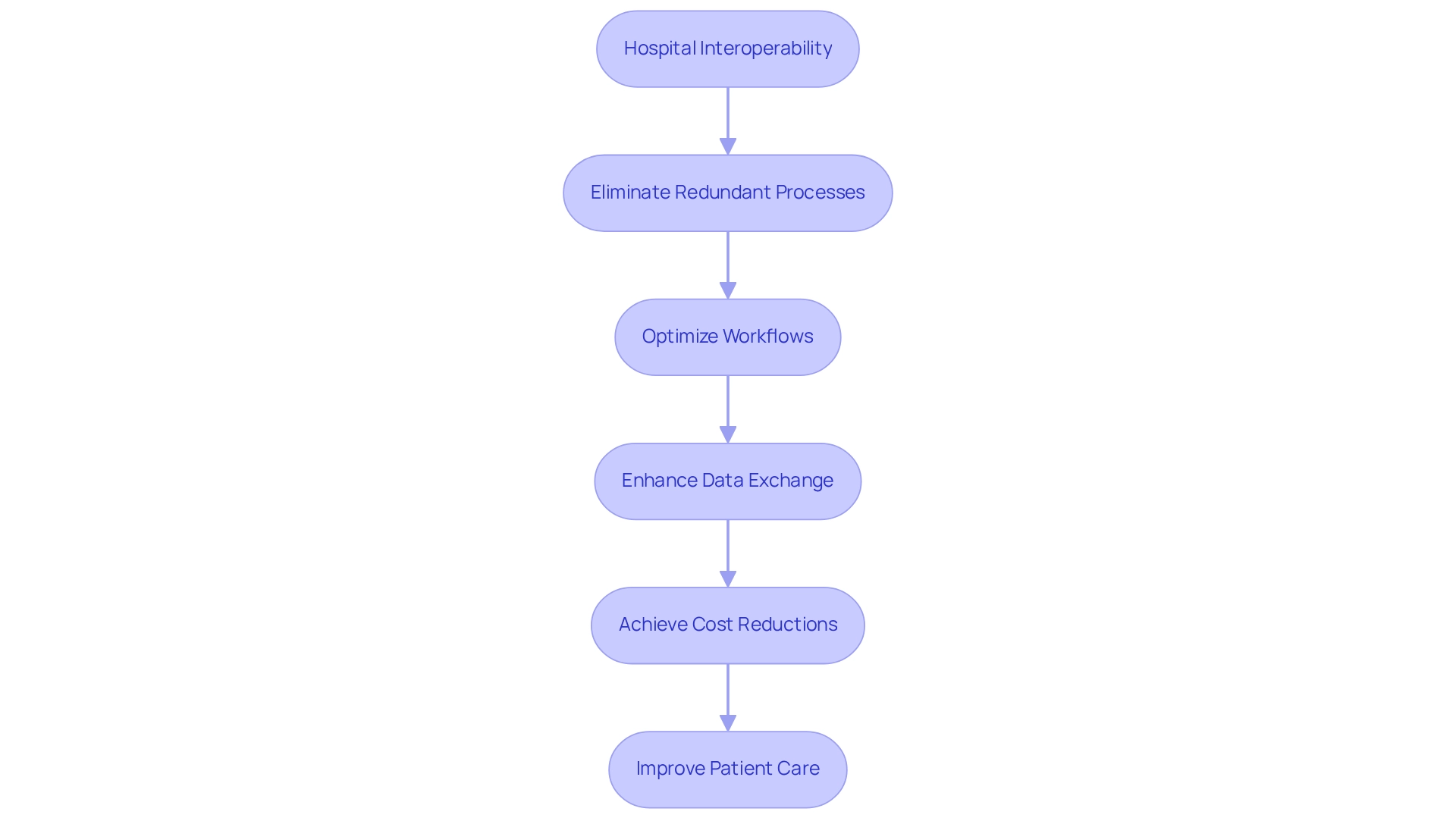
Real-Time Access to Patient Information for Timely Decisions
Instant access to individual information transforms medical service delivery. We understand that Avato’s secure hybrid integration platform empowers medical providers to instantly access and share essential information, facilitating swift decision-making. Designed for secure transactions, our platform is trusted by banks, medical institutions, and government sectors, ensuring 24/7 uptime and reliability—critical for emergency situations where prompt access to an individual’s allergies, medications, and medical history can be lifesaving.
Research suggests that prompt access to medical information is linked to better health outcomes, as demonstrated by a case study indicating that individuals admitted to the emergency department had greater chances of seeing their test results compared to those released. This capability not only enhances the standard of care but also increases operational efficiency, allowing medical teams to respond swiftly to patient needs.
The vital role of XML in ensuring hospital interoperability and durability for integration projects cannot be overstated; interoperability guarantees that crucial details are accessible when they are needed most, ultimately promoting a more efficient, responsive, and patient-centered medical framework. Furthermore, XSLT, with its advantages in converting XML information, streamlines the process of handling information, simplifying the integration of diverse frameworks.
As one specialist pointed out, ‘This technology not only facilitates prompt response times but also establishes the foundation for a more efficient, responsive, and patient-centered medical system.’
What’s holding your team back from leveraging this transformative technology?
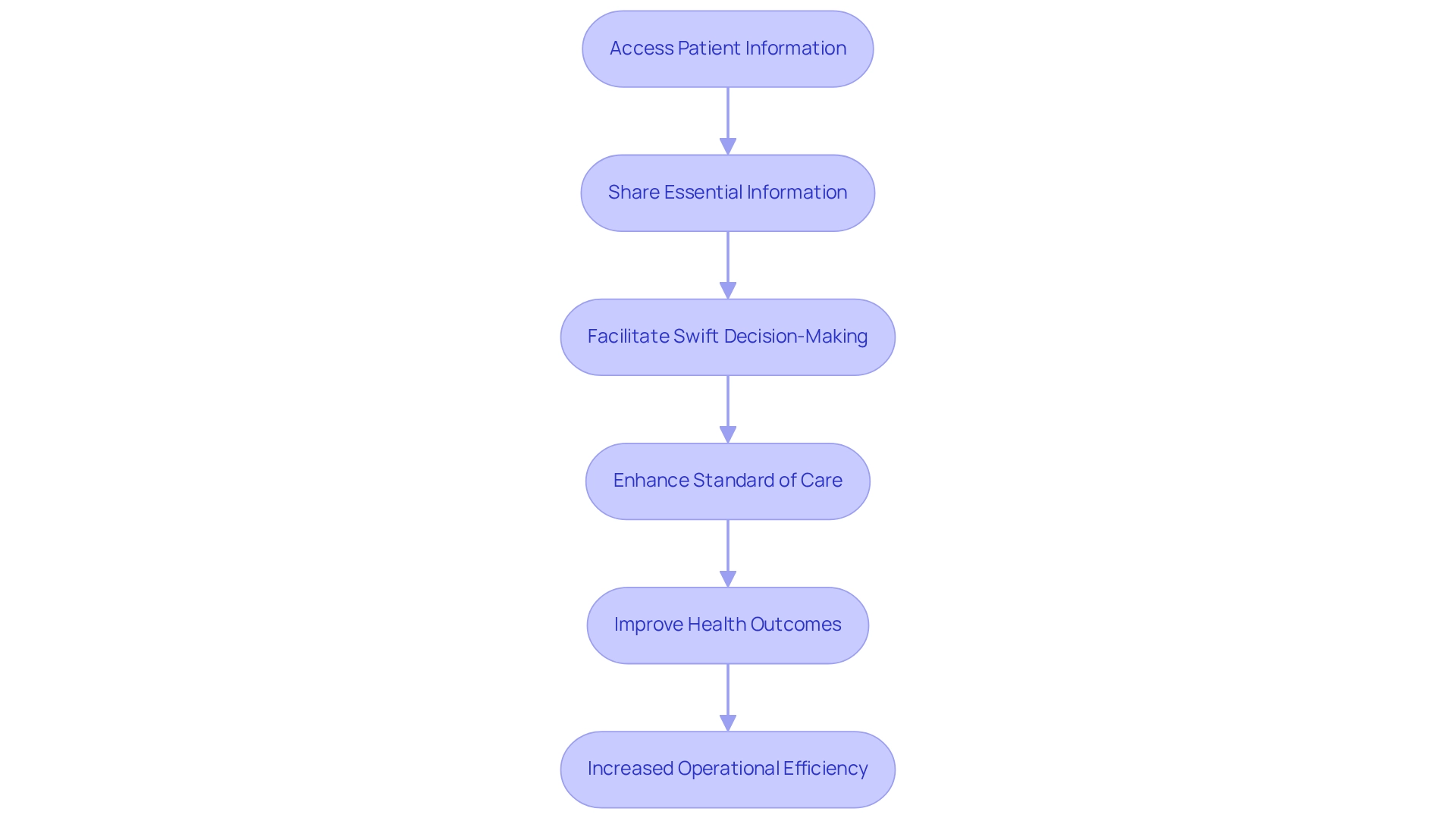
Improved Collaboration Among Healthcare Teams
Hospital interoperability significantly enhances collaboration among healthcare teams by creating a unified platform for communication and information sharing. When all team members have access to the same client information, we can collaborate more effectively, leading to well-coordinated care plans and improved outcomes.
For instance, a multidisciplinary group can work together on an individual’s treatment by accessing shared information, engaging in real-time discussions, and making collective decisions that prioritize the individual’s best interests. This collaborative approach not only streamlines workflows but also fosters a culture of teamwork, which is crucial for delivering high-quality care; additionally, statistics indicate that organizations adopting hospital interoperability solutions have seen a marked improvement in collaboration among medical teams.
Effective data sharing can reduce duplicated tests and procedures, ultimately lowering costs and enhancing patient satisfaction. Moreover, testimonials from medical professionals underscore the importance of unified communication platforms, which facilitate smooth interactions and information sharing among team members. Notably, John Johnstone from OSME Pacific and Gustavo Estrada from BC Provincial Health Services Authority have praised Avato for its ability to streamline complex integration projects, highlighting how hospital interoperability has bolstered their teams’ cooperation and productivity through Avato’s secure hybrid integration platform.
Avato’s Hybrid Integration Platform enhances this cooperation by providing real-time monitoring and alerts on operational performance, ensuring that medical teams can respond swiftly to any concerns. Furthermore, it adds value to legacy frameworks, allowing for smoother integration of current technologies.
Case studies demonstrate that medical institutions utilizing integrated systems, such as Avato’s, have successfully improved their coordinated care plans. For example, hospitals that have implemented hospital interoperability solutions reported better communication between departments, resulting in quicker decision-making and improved management of individuals. This evidence illustrates the transformative impact of hospital interoperability on medical collaboration, paving the way for more efficient and effective care for individuals.
Expert insights suggest that as medical teams increasingly rely on integrated solutions like Avato’s, the potential for enhanced outcomes for individuals rises, emphasizing the critical importance of hospital interoperability in modern medical care.
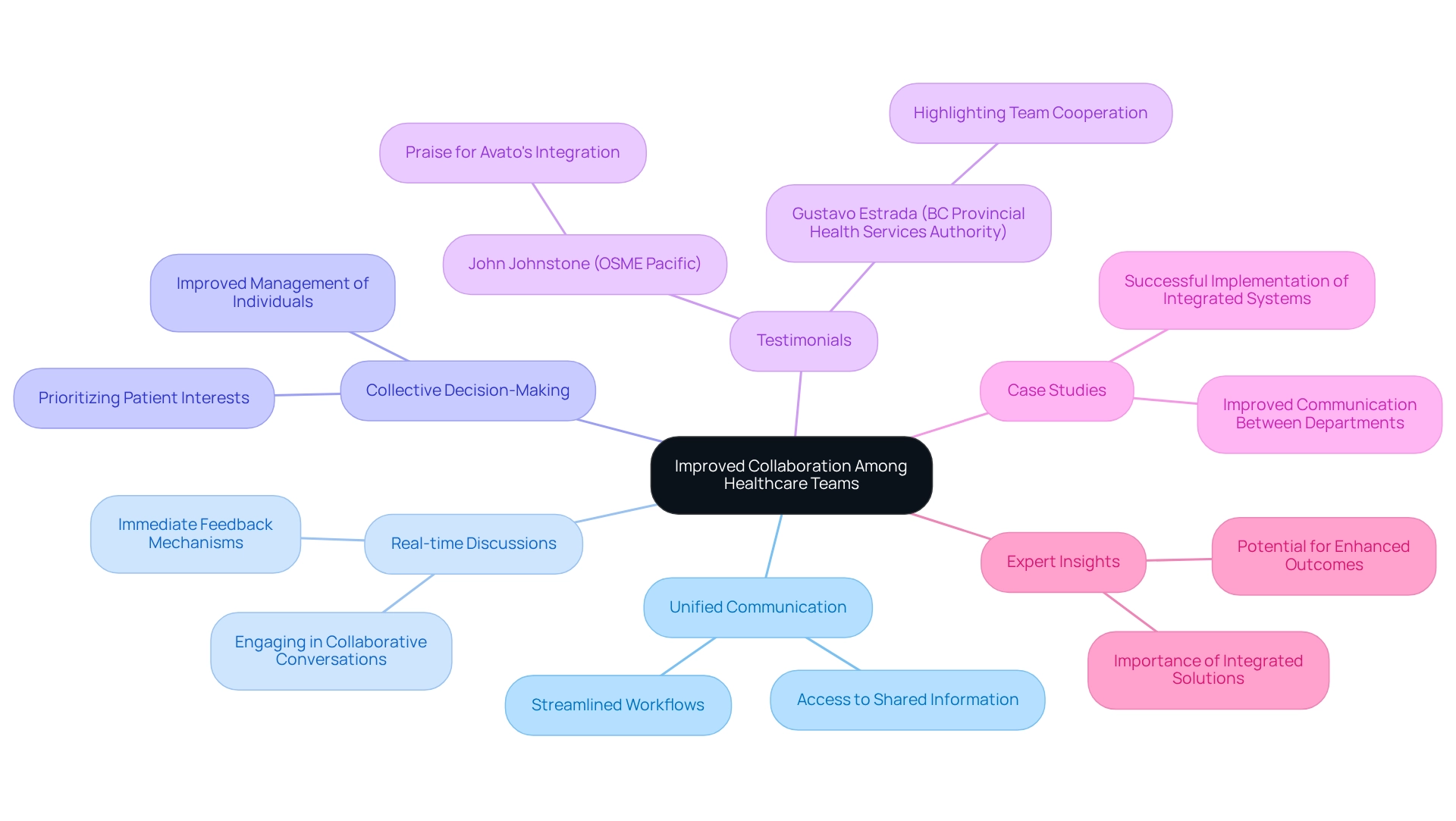
Increased Data Accuracy Leading to Enhanced Patient Safety
Interoperable systems significantly enhance information accuracy by minimizing human error linked to manual input and isolated information silos. When we ensure client information is consistently refreshed and communicated across various platforms, medical providers can depend on accurate details for clinical decision-making. This accuracy is vital for safety, as it reduces the likelihood of medication errors, misdiagnoses, and other potentially harmful mistakes. Improved information integrity not only leads to better health outcomes but also fosters greater trust in the healthcare network.
For instance, research indicates that implementing compatible frameworks could yield annual cost savings of approximately $2,452,800 by decreasing documentation durations for nurses, thereby allowing them to focus more on patient care. Our Hybrid Integration Platform plays a pivotal role in this process by maximizing and extending the value of legacy systems, simplifying complex integrations, and providing real-time monitoring and alerts to ensure accuracy.
However, the effect of hospital interoperability on timeliness and enhancements to clinical workflow remains inconclusive, as noted by Ana Luisa Neves, MBChB, MSc, PhD. Furthermore, the case study on individual empowerment through hospital interoperability illustrates how seamless access to health records across various providers boosts engagement and satisfaction, underscoring the importance of interoperability in delivering person-centered care.
As we advance in the medical field, addressing hospital interoperability challenges, such as the frequent issue of incomplete or missing information, is essential for enhancing care quality and ensuring patient safety. The use of schemas within our platform further guarantees information integrity, significantly reducing costs associated with errors and improving the overall effectiveness of integration projects. Our commitment to architecting technology solutions is evident in our dedication to delivering results that unlock isolated assets and facilitate business value creation.
Regulatory Compliance Through Integrated Systems
Unified frameworks are essential for regulatory adherence, empowering healthcare organizations to monitor and convey vital information effectively. We recognize that Avato’s Hybrid Integration Platform streamlines complex integrations, enabling us to enhance the value of legacy technologies while ensuring 24/7 availability and dependability. Hospital interoperability simplifies compliance processes, making it easier to adhere to regulations such as HIPAA and other data protection laws. For instance, our automated reporting features enhance record accuracy and expedite the submission of required documentation, significantly reducing the risk of non-compliance and the associated penalties.
Statistics reveal that organizations utilizing integrated solutions, like those powered by Avato, experience a notable decrease in compliance-related incidents, including:
- Billing compliance violations
- Privacy breaches
- Documentation deficiencies
- Missed reporting deadlines
- Medication safety events
This improvement underscores the importance of selecting the right partner for integration and hospital interoperability, as it directly influences our ability to meet regulatory demands.
A case study involving the Shared Services of the Ministry of Health in Portugal exemplifies this point. By optimizing procurement processes and enhancing eHealth cross-border affairs, the organization improved overall health service delivery, demonstrating how integrated systems can effectively support regulatory compliance. These enhancements in service delivery are directly linked to compliance, showcasing the tangible benefits of hospital interoperability.
Furthermore, compliance officers emphasize that hospital interoperability is crucial for meeting regulations. One stated, “Hospital interoperability is essential for ensuring that we can manage data effectively and meet compliance requirements without unnecessary delays.” This interconnectedness not only aids in HIPAA compliance but also enhances the overall operational efficiency of healthcare organizations. Additionally, with 67% of global executives believing ESG regulation is too complex, integrated systems like Avato’s can simplify these processes, making compliance more achievable.
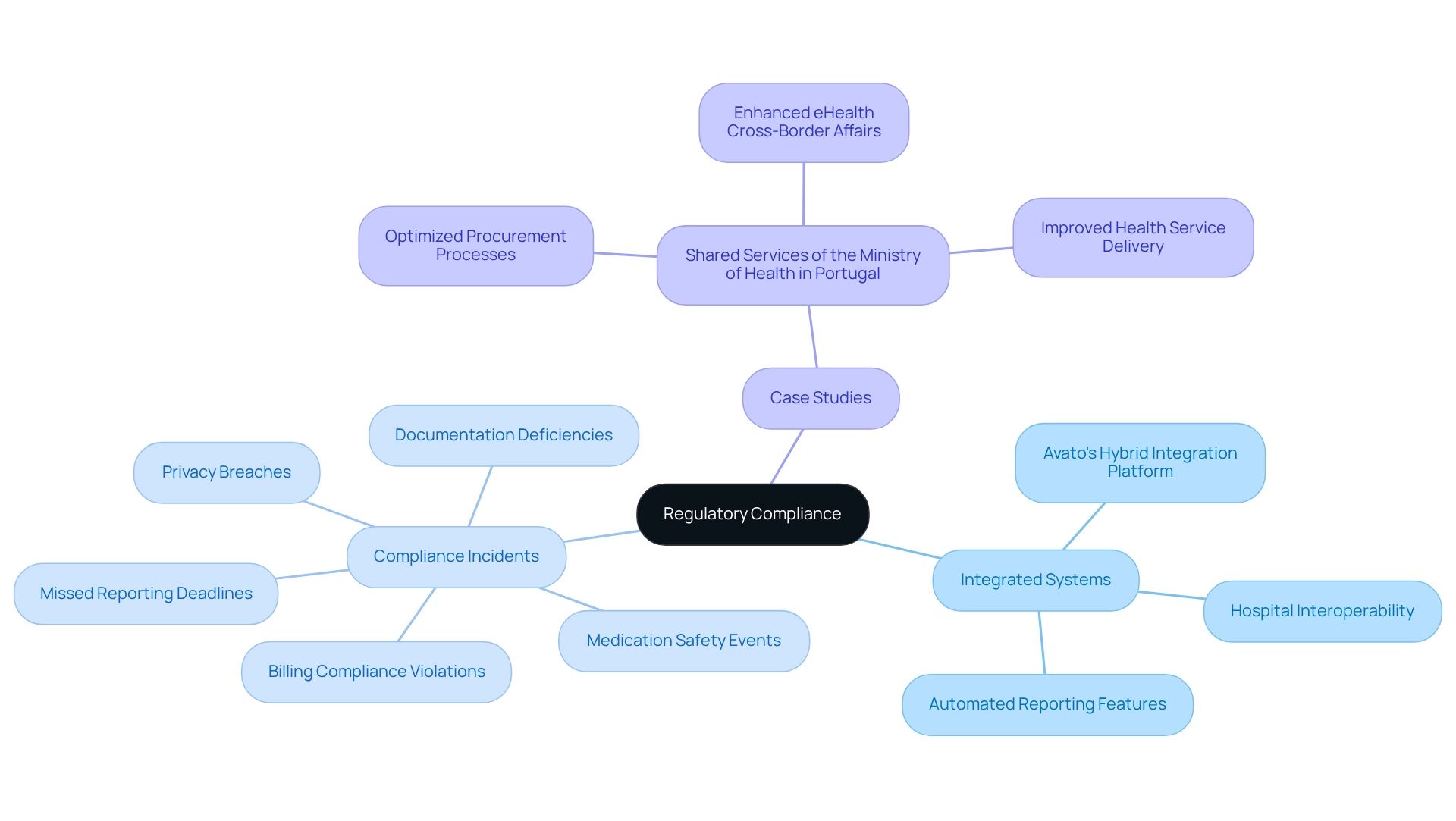
Boosted Patient Engagement via Accessible Health Data
Hospital interoperability significantly enhances individual engagement by providing users with seamless access to their health data. When individuals can easily view their medical records, test results, and treatment plans, they are empowered to take a proactive role in their healthcare journey. This empowerment not only encourages enhanced communication between individuals and providers but also results in better adherence to treatment plans and increased satisfaction with care.
For instance, consumer portals that enable secure messaging and appointment scheduling have been demonstrated to improve the overall user experience. Furthermore, a systematic review of studies on individual access to medical records utilized a rigorous methodology to evaluate the evidence, highlighting variability in quality but indicating many positive outcomes in chronic disease management.
In addition, a thorough economic analysis showed that the return on investment for engagement analytics averages 3.2:1 over a three-year span, highlighting the financial advantages of such initiatives. As healthcare providers increasingly acknowledge the significance of transparency, the implementation of portals for individuals receiving care is becoming crucial for promoting effective communication and engagement between providers and those they serve.
We recognize that Avato, with its dedicated hybrid integration platform, plays a pivotal role in simplifying disparate systems, thereby enhancing data accessibility and empowering individuals. As Traber Davis Giardina mentioned, although few positive findings generally supported access for individuals, there is a pressing need for more rigorous research to evaluate this practice.
By enhancing patient engagement through hospital interoperability, we can not only improve patient experiences but also attain operational efficiencies that resonate with banking IT managers.
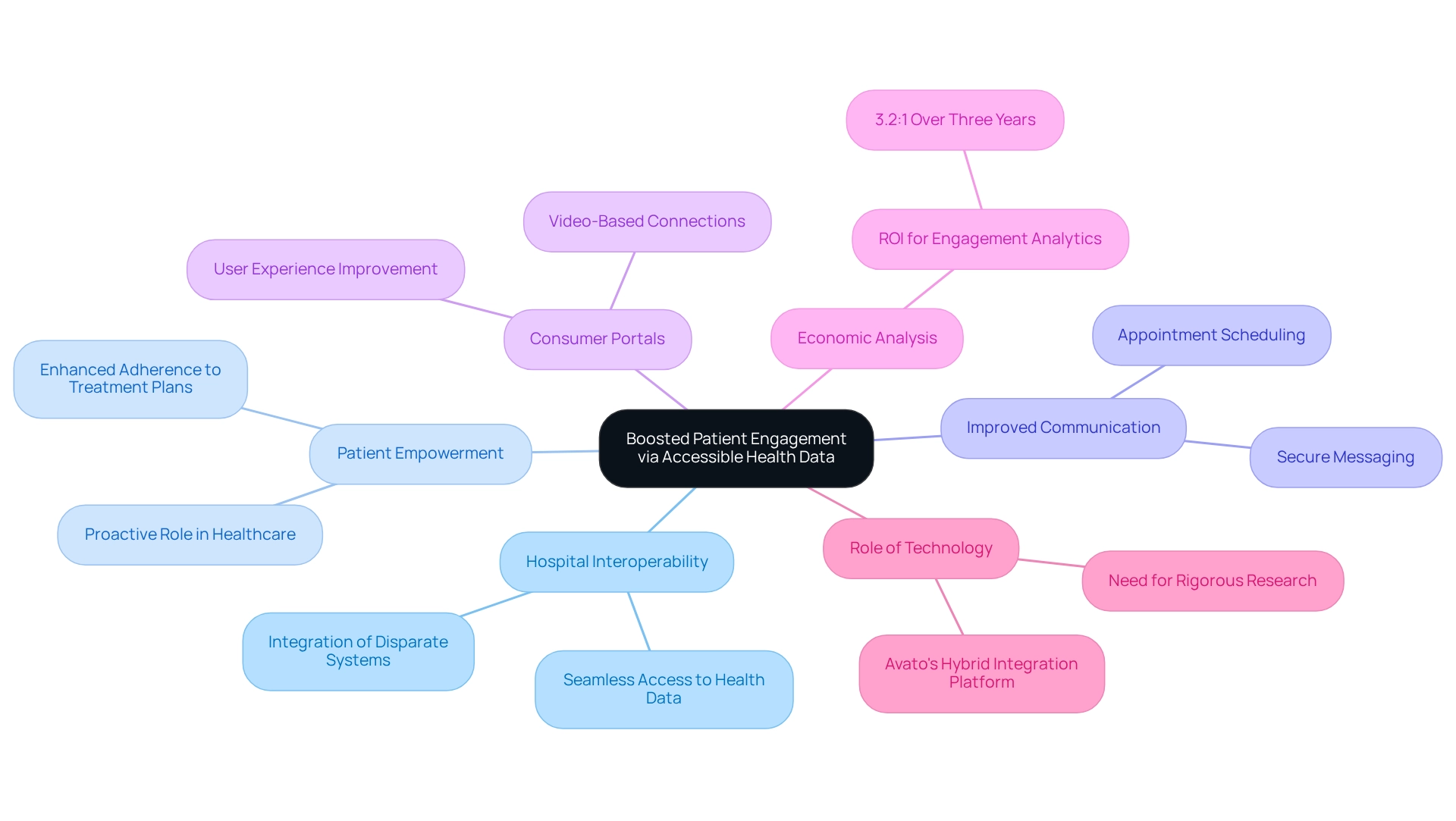
Enhanced Population Health Management Through Data Analytics
Hospital interoperability is crucial in advancing population health management, as it enables us to seamlessly collect and analyze health information across diverse systems. By combining information, we can effectively recognize trends, track health outcomes, and execute targeted interventions that significantly improve community health.
For instance, analyzing data can reveal trends in chronic illness occurrence, empowering us to develop proactive approaches to address these challenges. This data-driven strategy not only enhances individual healthcare but also bolsters broader public health initiatives.
Notably, healthcare providers leveraging predictive modeling and real-time data analytics have reported impressive outcomes, including:
- A 30% reduction in emergency room visits
- A 50% improvement in screening rates for preventive services
As we increasingly prioritize investments in innovative tools and strategies, our commitment to hospital interoperability will pave the way for more effective and efficient care, ultimately leading to improved health outcomes across populations.
Avato’s Hybrid Integration Platform is instrumental in this landscape, simplifying complex integrations, maximizing the value of legacy systems, and providing real-time monitoring and alerts on system performance, ensuring 24/7 uptime and reliability.
According to the editors at Health Catalyst, organizations that fully embrace population health analytics and invest in new tools and strategies are better positioned to provide effective and efficient patient care. Furthermore, our solutions empower organizations to maintain a competitive edge in their respective industries, reinforcing the critical role of hospital interoperability in achieving these advancements.
Conclusion
At Avato, we are revolutionizing healthcare through our hybrid integration platform, which enhances interoperability—a critical factor in improving patient care and operational efficiency. By seamlessly connecting legacy systems with modern applications, we enable healthcare providers to access vital patient information in real time. This capability significantly reduces the risk of misdiagnoses and medication errors, fostering better collaboration among healthcare teams and leading to more coordinated care.
Our platform’s real-time monitoring features ensure reliability and minimize downtime, maximizing the value of existing technologies. As organizations increasingly recognize the importance of interoperability, they can leverage data analytics to identify health trends and implement targeted interventions, ultimately enhancing community health outcomes.
Furthermore, we simplify compliance with regulatory requirements, streamlining processes that promote patient safety and operational effectiveness. Embracing interoperability is essential for creating a patient-centered healthcare environment focused on safety, efficiency, and collaboration.
In a rapidly evolving healthcare landscape, organizations that invest in integrated solutions like ours will be better positioned to deliver high-quality care and adapt to changing demands. Our commitment to interoperability is vital for fostering an effective healthcare system that meets the needs of patients now and in the future. What steps are you taking to ensure your organization is prepared for the future of healthcare?

